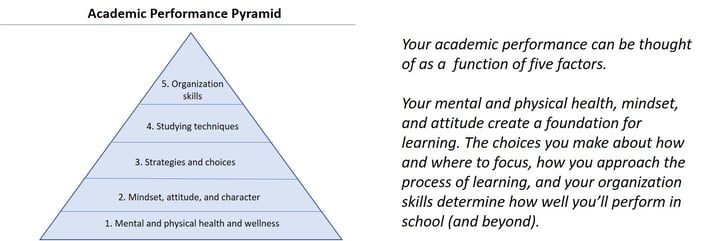Education researchers and practitioners are rapidly bringing forth powerful new ideas to help students perform better in school and on tests.
For example, the latest academic reserach suggests that we should:
- Adopt (or encourage your child to adopt) a growth mindset vs. a fixed mindset
- Study via frequent “mini tests” vs. focusing on reading chapters and taking notes
- Organize to-do lists around medium term objectives (like projects, etc.), not a list of daily tasks
However, the pure volume of books, web-sites, and suggestions can be difficult to navigate. We’ve tried to cut through the clutter to highlight what we view as the most important books to read and ideas to implement.
To do this, we've developed a framework called the "academic performance pyramid" to help students and parents think about how to perform better in school and on standardized tests. We hope this framework is simple way to organize information about academic performance such that it's easier to digest new insights, easier to identify linkages across topics, and easier to identify where you might want to start to make changes.
We've placed our book recommendations within the framework of this pyramid.

1. The Foundation: Mental and physical health and wellness
The scientific community and the general public seem to be slowly coming around to the notion that how well a person performs in school, at work, in sports, or in interactions with friends and loved ones is influenced significantly by their general level of health. Lack of sleep, poor nutrition, and limited exercise can result in poor memory, slower cognition, irritability, and inability to focus. If you are trying to understand how to improve academic performance, you should start with overall physical and mental health. It's the foundation upon and the context within which all relevant academic skills are developed.
Relevant reading:
- Brain Rules: 12 Rules for Surviving and Thriving at Work, Home, and School – by John Medina or read our Summary of Brain Rules
- Headstrong Performance: Improve Your Mental Performance With Nutrition, Exercise, and Neuroscience by Marcel Daane
- Sleep Smarter by Shawn Stevenson
2. Mindset, Attitude, and Character
One of the most important ways students can begin to transform their academic lives is to realize that intelligence is not static and can grow over time. Genetics matters, but not as much as most people probably think it does. With the right mindset and focused-practice, most students can earn As in daunting subjects, like calculus or physics. Truly accepting the premise that you are in full control of your academic life and can build your intelligence steadily over time is a foundational step in improving performance in school. Character traits such as "grit' and persistence are far more important than you probably think (e.g., they are on average more important in earning high grades than performance on IQ tests).
Relevant reading:
- Mindset: The New Psychology of Success – by Carol Dweck (see our book summary here)
- How Children Succeed: Grit, Curiosity, and the Hidden Power of Character – by Paul Tough
- Grit: The Power of Passion and Perseverance – by Angela Duckworth
- The Complexity of Greatness: Beyond Talent or Practice - A variety of perspectives and the most cutting-edge research on genes, talent, expertise, practice, creativity, savants, passion, and persistence. – by Scott Barry Kaufman
3. The importance of strategy and choices
While having the right mindset and being persistent and gritty is important, the difference between more successful vs. less successful students and young professionals can often be explained by the use of clear strategies to reach specific goals. Successful students go about their academic life strategically.
- 9 Things Successful People Do Differently by Heidi Grant Halvorson
- How to Be a High School Superstar: A Revolutionary Plan to Get into College by Standing Out (Without Burning Out)– Cal Newport
- How to Win at College: Surprising Secrets for Success from the Country’s Top Students – Cal Newport
- How to Become a Straight-A Student: The Unconventional Strategies Real College Students Use to Score High While Studying Less – Cal Newport
- So Good They Can’t Ignore You: Why Skills Trump Passion in the Quest for Work You Love – Cal Newport
- Plan, Prepare & Perform: A Strategic Approach to Test Prep Fueled by Expert Tutor Insights and Scientific Research on How We Learn – by Mark Skoskiewicz
4. Applying the latest in “learning science” to study more effectively
Once the belief that academic success is in the control of the student is fully adopted, goals are set, and strategies are adopted, there are specific approaches to studying and best-practices in learning new things that have been scientifically validated. Books in this section explore these ideas.
- A Mind for Numbers: How to Excel at Math and Science - by Barbara Oakley
- Make it Stick: The Science of Successful Learning – by Peter C. Brown
- The Genius in All of Us – New Insights into Genetics, Talent, and IQ – by David Shenk
- Talent is Overrated – What Really Separates World-Class Performers from Everybody Else – Geoff Colvin
- PEAK: Secrets from the New Science of Expertise – by Anders Ericsson and Robert Pool
- The Talent Code: Greatness Isn’t Born, It’s Grown. Here’s How – by Daniel Coyle
5. Organizing yourself to reduce stress, eliminate mistakes, and be more productive
Finally, once you believe you have control over your academic life, you’ve developed a strategy for a specific class, and you have the latest tools in “learning science” at your disposal, it’s time to execute.
- Smarter, Faster, Better: The Secrets to Being Productive in Life and Business – by Charles Duhigg
- Deep Work: Rules for Focused Success in a Distracted World – by Cal Newport
- The Power of Habit: Why Wo Do What We Do in Life and Business – by Charles Duhigg
- Getting Things Done: The Art of Stress-Free Productivity – by David Allen

